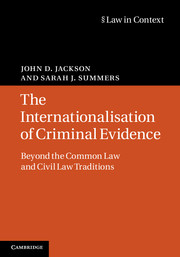Book contents
- Frontmatter
- Contents
- Foreword
- Preface and acknowledgements
- Abbreviations
- Table of international cases
- Part I Evidentiary contexts
- Part II Evidentiary rights
- 6 Fair trials and the use of improperly obtained evidence
- 7 The presumption of innocence
- 8 Silence and the privilege against self-incrimination
- 9 Defence participation
- 10 Challenging witness evidence
- 11 Towards a theory of evidentiary defence rights
- Index
- References
9 - Defence participation
Published online by Cambridge University Press: 05 June 2012
- Frontmatter
- Contents
- Foreword
- Preface and acknowledgements
- Abbreviations
- Table of international cases
- Part I Evidentiary contexts
- Part II Evidentiary rights
- 6 Fair trials and the use of improperly obtained evidence
- 7 The presumption of innocence
- 8 Silence and the privilege against self-incrimination
- 9 Defence participation
- 10 Challenging witness evidence
- 11 Towards a theory of evidentiary defence rights
- Index
- References
Summary
Introduction: legal representation and self-representation
We have seen how through concepts such as the equality of arms and the right to an adversarial procedure, human rights jurisprudence has been developing a theory of effective defence participation which not only allows for the participation of the accused in the criminal proceedings, but also gives institutional rights to the defence as a party entitled to be treated on an equal basis as the prosecution. These institutional rights have their foundation in what the ECtHR has described as the ‘minimum’ rights laid down in Article 6(3) of the ECHR and also set out in the other human rights instruments – the right to be informed of the charges, to have adequate time and facilities to prepare the defence, the right to defend oneself or to have the assistance of counsel, the right to test witness evidence and, finally, the right to the free assistance of an interpreter.
At the core of the right to defence participation lies the right to defend oneself in person or through legal assistance of one's own choosing. This right has been described as ‘practically absolute’, although as we saw in the last chapter there has been some uncertainty about the stage in the criminal process at which legal assistance can come to the aid of defendants. Built into the wording is a strong notion of individual participation by the accused. Defendants can choose to defend themselves or through legal assistance of their own choosing. The suggestion is that counsel is there at the personal choice and as the personal representative of the accused. In this sense, the right to legal assistance can be depicted as an expression of the principles of individual dignity and autonomy that have overlain so many of the individual rights in human rights instruments. Legal assistance serves to promote individual dignity by helping to alleviate the stress of facing charges and helping to supervise and control the activities of the law enforcement officers, ensuring that accused persons are treated properly. As well as acting in a protective capacity, counsel can also give expression to defendants’ participation more effectively than defendants themselves, provided they faithfully adhere to carrying out their clients’ instructions and act in accordance with their wishes.
- Type
- Chapter
- Information
- The Internationalisation of Criminal EvidenceBeyond the Common Law and Civil Law Traditions, pp. 285 - 324Publisher: Cambridge University PressPrint publication year: 2012



